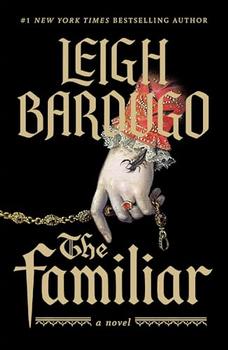Summary | Excerpt | Reading Guide | Discuss | Reviews | Beyond the Book | Readalikes | Genres & Themes | Author Bio

A Novel
by Leigh Bardugo
But the cook wasn't there.
Valentina intended to remain, sweating in the heat from the fireplace, her anger rising to a furious boil, refining a long rant against wastefulness, negligence, and the cook's general character. But a knock at the door echoed above, and Valentina knew it might be someone who wished to speak to her husband about his olives. It might even be an invitation—unlikely, but just the hope was enough to make her move. There was no one else to answer the door at Casa Ordoño. Her husband had made it clear they could afford no additional servants and that she was lucky to have a cook and a scullion to help her around the house. There was nothing to do but set aside her rage and stomp back up the steps, dabbing at her moist face with her sleeve.
When she marched down the stairs again, a letter from her father stuffed unread into her sleeve, she heard the cook nattering about something to the squat lump of a scullion girl who smelled of damp and who was always stumbling about the house with her eyes on her graceless feet.
"Águeda," Valentina said as she burst into the kitchen, voice vibrating with the righteousness of a good scold, "can you tell me why you see fit to waste my husband's fortune and my time by once again burning the bread?"
The cook looked at her dully, sullen eyes red from crying over her foolish son, then turned her gaze to the table at the center of the kitchen, where the bread waited in its black pan.
Even before Valentina looked, she felt her body flush, the likelihood of her own humiliation coming on like a sudden storm. The bread sat, a little golden cushion in its iron bed, its top high, glossy, and golden brown, perfectly risen, perfectly baked.
Doña Valentina wanted to examine the bread, poke it with her finger, and declare it a liar. She had seen that same bread only minutes ago, blackened and ruined, its dome of crust collapsed by heat. And she knew, she knew it was not another loaf drawn from the fire to replace the first because she recognized that iron pan with its slightly dented corner.
It wasn't possible. She had been gone only a few minutes. They're playing a trick, Valentina thought, the stupid cook and the stupid kitchen girl are trying to goad me, to get a reaction and make me look a fool. She would not give them the satisfaction.
"You have burned the bread before," she said lightly, "and I have no doubt you will do it again. See to it that our midday meal is not late to table."
"Will Don Marius be home to dine, señora?"
Valentina considered slapping the cook's smug face. "I don't believe so," she said brightly. "But I will have two friends joining me.
What are you preparing?"
"The pork, señora. Just as you asked."
"No," Valentina corrected. "It was the quail I requested. The pork is for tomorrow, of course."
Again the cook stared at her, her eyes hard as stubs of coal. "Of course, señora."
Valentina knew very well that she had requested the pork. She had planned the meals for the household a week prior as she always did. But let the cook remember that this was her home and she was never to be the butt of the joke.
After Doña Valentina left, Luzia plucked the quail and listened to the cook mutter angrily as she set aside the stewed pork, pots and pans clattering. She was making a fuss, but the pork could be kept for tomorrow with little trouble. It was Doña Valentina's manner that had further soured Águeda's miserable mood. Luzia was almost grateful. An angry Águeda was better company than a moping Águeda.
Still Doña Valentina's unhappiness bled into everything, and each time she came to the kitchen Luzia worried her bitterness might turn the milk or cause the vegetables to spoil. Her aunt had warned her long ago that some people brought misery with them like weather, and she'd told the story of Marta de San Carlos, who, jilted by her lover, had gone for a walk along the leafy paths by the Alcázar and wept so long and so hard the birds had joined in. For years after, anyone who entered the gardens and heard the birds sing was overcome by sadness. Or so Luzia's aunt said.
Excerpted from The Familiar by Leigh Bardugo. Copyright © 2024 by Leigh Bardugo. Excerpted by permission of Flatiron Books. All rights reserved. No part of this excerpt may be reproduced or reprinted without permission in writing from the publisher.
Your guide toexceptional books
BookBrowse seeks out and recommends the best in contemporary fiction and nonfiction—books that not only engage and entertain but also deepen our understanding of ourselves and the world around us.